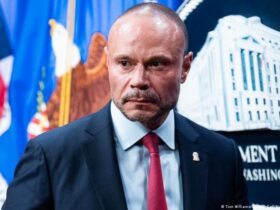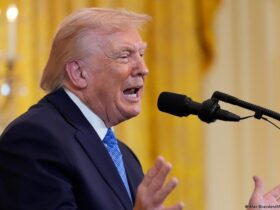
US Secretary of State Antony Blinken on Thursday announced $200 million in new humanitarian funding for the Sudanese people as he chaired a high-level Sudan meeting at the UN Security Council, giving Sudan its biggest boost since fighting broke out between rival generals. Total US support exceeded $2.3 billion. In April 2023.
US Special Envoy for Sudan Tom Perriello speaks with VOA UN correspondent Margaret Beshear on the sidelines of the council meeting. He said the outgoing administration of US President Joe Biden wants to consolidate humanitarian progress and move toward a ceasefire, even if temporary, in its remaining weeks.
Sudanese Armed Forces Gen. Abdel Fattah al-Burhan and Rapid Support Forces Gen. Mohamed Hamdan Daglo, once allies in Sudan’s transitional government, have become arch rivals for power after the 2021 coup. Last year, fighting broke out between their forces in the capital Khartoum. It has since spread throughout Sudan, leading to mass atrocities and killings and becoming one of the world’s largest humanitarian crises.
The following interview has been edited for clarity and brevity.
VOA: Tom Perriello, U.S. Special Envoy for Sudan, thank you for speaking to VOA today. You have a month for the Biden administration. What do you realistically think you can achieve in the remaining weeks on Sudan?
US Special Envoy for Sudan Tom Perriello: Well, one of the things that Secretary Blinken made clear at the United Nations today is that we will use every moment we’ve got and we’ve got some momentum. We are in the fifth consecutive month of breaking the largest humanitarian embargo in the world, but we still have a lot to do. We have sent four times as much food and medicine to Sudan as we did just a few months ago, and every bit of that food and medicine is reaching a mother or child who has been malnourished for months in places like Zamzam camp or Kadugli. South Kordofan. We are moving convoys, including the first convoys into parts of southern Khartoum since the war began almost two years ago. Therefore, we are locked out of humanitarian benefits that are saving lives. But ultimately, to provide some relief to the dire conditions millions of Sudanese people face, we need the parties to move toward a ceasefire, even a temporary ceasefire.
VOA: And how do you expect to move toward that temporary ceasefire? Can you call another meeting of ALPS? [Aligned for Advancing Lifesaving and Peace in Sudan] Before January 20th?
Periello: I just came from Mauritania yesterday, where we were meeting with the African Union, the United Nations, the Arab League and others on how we can move forward to expand both local and national ceasefire efforts. It was a big statement for Secretary Blinken to sit on the Council at the United Nations today and you heard from Algerian and other African leaders the idea that we need to give this ceasefire more urgency. …This famine and this war was a war of choice by those who wanted to let the Sudanese people suffer, and those same people can help end it if we can get regional actors in Africa and the Gulf to stop the fighting. Engage in efforts to impose and restore civil change.
VOA: Would you say that these two generals are the biggest obstacles to peace? Is it just about his ego? Or does it go even deeper?
Periello: Well, certainly that was a big part of the beginning of this war. But really, you have to take a few steps back and remember that it was General Hemeti [Mohamed Hamdan Dagalo] And [Abdel Fattah] Al-Burhan is joining forces to root out the civilian infection that gripped the world in 2019. And behind both of them are many forces who want to prevent the people of Sudan from taking control of their future. And we’re seeing extremist groups and others who want to profit from this war, whether it’s groups like the former Bashir-era National Congress Party, who know that people will not support them if they have power, and they use that It was to come back to power. We see some tribal leaders who should be some of the strongest voices for peace, instead of figuring out how to profit from famine and war, we see countries that are engaged and continue that suffering. Are willing to keep the Sudanese people. But we have also seen neighboring countries welcoming millions of refugees. We’ve seen efforts to work with us on these local ceasefire efforts in the region, including some of these humanitarian corridors. Therefore, it is important that we do not use the level of crisis as an excuse to do nothing, because when we are engaged, we are able to create change. And I think that’s what Secretary Blinken was trying to remind the Council today.
VOA: What will it take to bring the two generals to the negotiating table?
Periello: Well, first of all, I think we will continue to try to bring them to the table, but what we showed with the ALPS efforts on humanitarian access in Switzerland is that you no longer need the table. We have telephones. There is close conversation between us. We need political will, and we appreciate that countries like Saudi Arabia and Egypt and others are continuing to try to support these peace efforts. We believe the African Union has a role to play in this. And the American people, just as we’ve seen Americans show so much compassion in crisis after crisis around the world, we need to look to the young people in Mutual Aid Sudan and elsewhere who are risking their lives to get food. and healing in their communities. They need support and attention from us. This is also something that clearly has really strong bipartisan support on Capitol Hill, including recent letters this week from both Republican and Democratic senators trying to draw more attention to the crisis in Sudan. So, we all need to pay more attention to this, but most of all, it needs the people who own guns and those who supply guns to all parties in Sudan to be put down and made partners in peace. Can go.
VOA: You mentioned, and Secretary Blinken mentioned in the Council, that there is too much outside interference in the war in Sudan. There is credible evidence that the UAE is encouraging violence and supplying weapons to the RSF. Why has the Biden administration been reluctant to actually put significant public pressure on the UAE?
Periello: Well, you saw some powerful testimony today in the Security Council about this issue, foreign interference, and the role that some countries are playing in fueling this conflict. The Biden administration has really led the way in putting pressure on all external actors to stop promoting this war and invite them to become partners in peace, try to end the famine and end this war. [U.S. Ambassador to the U.N.] Linda Thomas-Greenfield helped push the extension of the Darfur arms embargo – and also imposed the first sanctions for violating that arms embargo in 15 years. We will continue our sanctions and our diplomacy to raise the costs of those who are fueling this conflict, but we will also continue to invite those who want to be partners in peace not only for the Sudanese people, but also Also want to be a partner in how we rebuild. Sudan and how we restore that civilian transition. Secretary Blinken today announced an additional $30 million with Congress to support civil society, especially women and youth, who continue to inspire us in Sudan, to help rebuild that political dialogue and that path. For – the only real way forward – is a unified citizenry in the face of peace and democracy.
VOA: There are reports that the State Department is considering a genocide declaration. Why the reluctance to use the word “genocide”?
Periello: Far from reluctantly, the State Department is actually paving the way. I mean, as someone who was in Darfur more than 20 years ago when the genocide was going on. When I was out of government a year ago, I was proud that the State Department led the way in declaring the acts of ethnic cleansing that we heard about today from the Sultan of Masalit. Called crimes against humanity. We will continue to see where the facts go with respect to other designations.






Leave a Reply